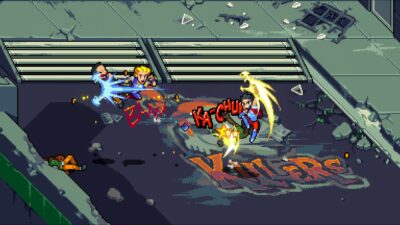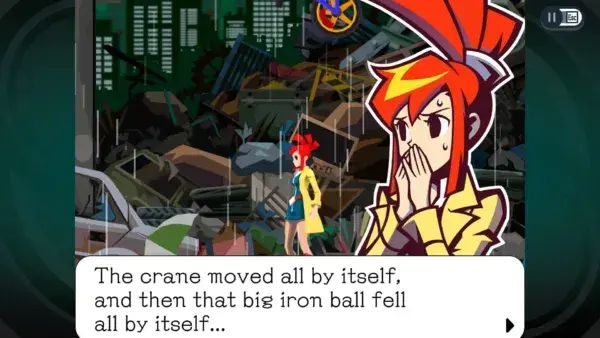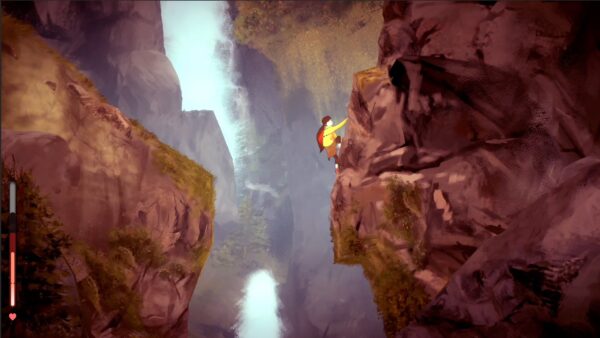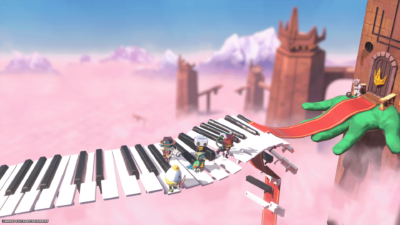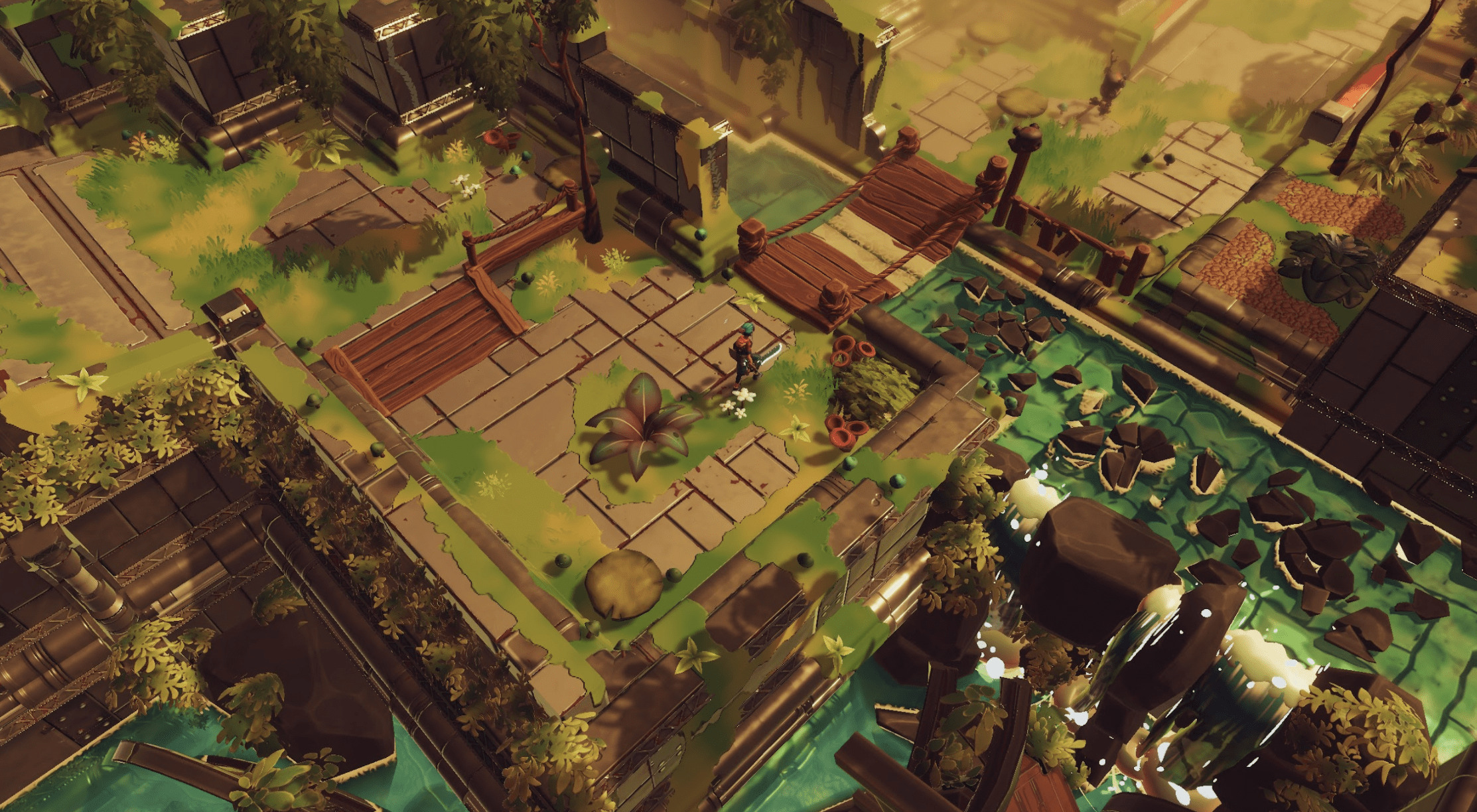
German developer Tiny Roar clearly isn’t interested in making life easy for itself. When it first began work on its upcoming Zelda-like, XEL (pronounced ‘k-sell’) a couple of years ago, the studio spent five months working on a prototype – only to throw the whole thing away and start again from scratch. “We all love action games and we all love Zelda, but we’d never worked on a Zelda-like,” explains studio co-founder and game director Maurice Hagelstein. “So we needed to make all the mistakes we could when making a game like this, and then we applied those learnings and condensed it down to, ‘What’s the core of XEL? How can we make it fun?’… It felt like, ‘OK, we need to start from scratch.’”
As Hagelstein readily admits, throwing all that work away was a wrench, but it was a key part of the studio’s learning process. Before XEL, Tiny Roar worked on much smaller titles such as Bomb Bots Arena (a modern take on Bomberman) and the mobile app, Talking Tom Cake Jump, making XEL a considerable step up in terms of scope and ambition. The project began about 18 months ago with a simple pitch: to make an action-adventure in the style of a traditional Zelda title, but with a sci-fi fantasy theme akin to the early Phantasy Star games. But rather than borrow the top-down view and more simplistic action of the earliest Zelda games, XEL takes place in a 3D overworld with expansive, puzzle-filled dungeons. Its fighting, meanwhile, will fuse elements of post-N64 era Zelda games with the satisfying weight and fluidity of Rocksteady’s Batman: Arkham series. “We have stuff like dodging, shielding, even deflecting,” Hagelstein says. “Then we’ve made everything faster, where you can target multiple enemies at the same time, similar to an Arkham game. The enemies are built in a way that you can go crazy. If you encounter enemies, there are some you can quickly slash and collect their stuff.”

Tying it all together is a sci-fi plot where amnesiac protagonist Reid attempts to uncover the secrets of the titular planet. Who is she? How did she wind up on XEL? And more ominously, what’s happened to the technologically advanced civilisation that once lived there?
Given the formidable task it’s set itself, we had to ask Hagelstein: didn’t he and his team consider making a simpler adventure – something more akin to the original Zelda from 1986? “Doing stuff in 2D is kind of expensive, because everything’s hand-drawn,” Hagelstein points out. “But with animation in 3D, you can share the rigs between characters, so certain characters can use the walk cycle of another. So in the long run, it’s cheaper – and we’re more experienced in 3D.”
Going the 3D route, rather than opting for 2D sprites, also means XEL avoids being pigeonholed as a ‘retro’ experience, Hagelstein says. “There’s always this tag when a game’s sprite-based, where the typical gamer that plays Fortnite will say, ‘Oh, this is an old game – this isn’t for me’. We wanted to make something that feels [current], and not too old-school.”
Hear me roar
Like any indie studio worth its salt, Tiny Roar has found creative ways of making its budget go further: reusable assets are cunningly dressed with a custom shader that simulates rust and grass to make them look aged and organic. More ambitious ideas that were present in the game’s original pitch have been trimmed away, leaving a more focused, “condensed” take on the Zelda formula – a less sprawling game than some open-world adventures we’ve seen of late, and one that respects the player’s time. Says Hagelstein: “I’m of an age where I have two kids. I love my video games, but I have to work. And when a game says, ‘You need 300-plus hours to finish it’, I’m like, ‘Oh, I don’t know…’ I’d rather have a short game where everything felt pretty amazing and memorable than have someone take three months to finish it, and the player only remembers the beginning and end of the story.”

Why is the world of XEL so empty? All will be revealed in the game, we’re told. From what we can gather, it’s all just a little bit dark
Nevertheless, Hagelstein tells us that making a game like XEL is a challenging proposition for an indie studio based in Germany. “Germany’s one of the main consumer countries of games, but we haven’t had a budget structure for the last 20 years,” he says. “It’s getting better, but we still need to prove ourselves… none of us have worked on a big action-adventure before, so a lot of stuff is self-taught. For example, we have one of the level designers from Crysis on our team, but he did shooters, right? It’s something different. So we have a lot of awesome people in the industry, but at some point, especially in Germany, people just either move countries, stop working in the industry, or stay at the same studio forever.”
Tiny Roar did have one useful resource available to it, though: Mark Brown’s excellent Game Maker’s Toolkit channel on YouTube. By studying his videos, and through simply trying out ideas and seeing what works, the 20-strong team has gradually built up its sci-fi fantasy world.
Dungeon Master
Brown’s videos came in particularly handy when designing XEL’s dungeons, Hagelstein says, adding that designing the puzzles that go into each one has provided a tricky balancing act. “It’s actually hard to design puzzles that aren’t overly complicated,” he says. “It’s rather easy to do complicated puzzles that aren’t readable, but we want an experience that everyone can play. So we’re not going to be the Sekiro of Zelda games or whatever.”

Again, Tiny Roar hasn’t exactly made life easy for itself when it comes to dungeon design. Rather than go for smaller, bite-sized challenges like those found in, say, Breath of the Wild, it’s instead opted for three or four much larger maps. “Yeah, it’s a pit we’ve made for ourselves,” Hagelstein agrees. “We wanted to have each dungeon be completely different in terms of how you experience it. So the first one is like exploring an old ruin; the second one is smaller and has a horror element to it; the third one is basically a gauntlet that challenges you to use everything you’ve learned until now, so it feels more like an arena.”
At the time of writing, XEL’s in the later stages of development, and work is still being done on those dungeons ahead of its planned release towards the middle of 2022. “We’re in the stage now where we’re stressing out,” Hagelstein says, half-jokingly. “We’re still polishing the dungeons – we’re putting everything together and seeing what doesn’t fit. That’s where we’re at. The fighting style change came pretty late, so we’ve put a lot of focus there. All the departments are still super-busy – it feels like the old Superman movies where everyone’s running around the Daily Planet office.”
What’s clear from our chat with Hagelstein is the affection he and his team has for the Zelda series. He talks rapturously about his memories of Christmas 1998, when he first played Ocarina of Time on the N64; he argues that Skyward Sword’s opening is one of his favourite in the entire series, even if he was ultimately put off by the original Wii version’s motion controls (“I died on the third Skulltula and just gave up”).
XEL is a love letter to those experiences, then, and one Hagelstein is clearly excited to introduce to the world, even if it’ll inevitably be compared to Nintendo’s hit series. “We’re always pretty honest about the budget or how big our team is, but people will still nitpick about everything. They don’t care if your game is triple-A or whatever: they will judge you always by what they get. And we’ll get compared to Zelda, which is going to be horrible for us and amazing at the same time. So if it succeeds, people will say, ‘Ah, it’s trying to be like Zelda’, and if we fail, they’ll say it’s completely [rubbish].”
Rather than serve as a competitor to the Zelda games, though, Hagelstein sees XEL as an appetising taster before Nintendo inevitably brings out Breath of the Wild 2 – or whatever its official title ends up being – at some point in the future. “We have a lot of bits from Zelda,” Hagelstein says, “but it should feel like this awesome snack if you’re looking forward to Breath of the Wild 2, which is just going to consume your whole life when it comes out – and mine as well.”
Genre Zelda-like | Format PC, Switch | Developer Tiny Roar | Publisher Assemble Entertainment | Release Q2 2022 | Social @tinyroargames


